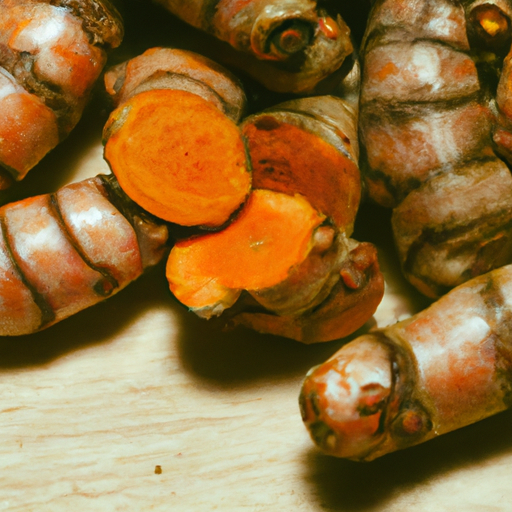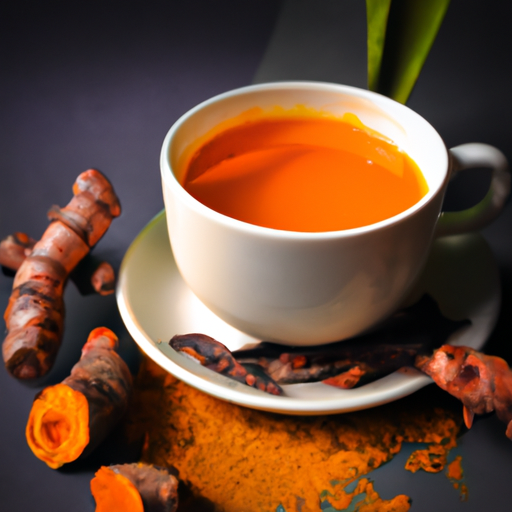Do you ever think about whether your preferred cup of turmeric tea has curcumin in it? Turmeric has been utilized for centuries, particularly in Ayurvedic medicine, for its many health advantages.
Curcumin, the active ingredient in turmeric, has been studied extensively for its anti-inflammatory and antioxidant properties. However, not all turmeric products are created equal, and the curcumin content can vary depending on the type of product and how it is prepared.
In this article, we will explore the differences between turmeric and curcumin, and whether turmeric tea contains curcumin. We will also discuss the health benefits of curcumin, the recommended daily intake, possible side effects and precautions, and other ways to incorporate turmeric and curcumin into your diet.
So, grab your cup of turmeric tea and let’s dive into the world of turmeric and curcumin.
Key Takeaways
- Turmeric contains curcumin, which has anti-inflammatory and antioxidant properties that can benefit health.
- Curcumin content can vary depending on the type and preparation of turmeric products.
- Boiling water can degrade curcumin in turmeric tea, and adding black pepper or coconut oil can enhance its bioavailability.
- Curcumin supplements are more concentrated and easily absorbed by the body than curcumin from turmeric tea, but they may interact with certain medications and cause gastrointestinal side effects. Consult with a healthcare professional before taking curcumin supplements.
Understanding the Differences Between Turmeric and Curcumin
Do you know that turmeric and curcumin aren’t the same thing? Turmeric is a spice commonly used in Indian and Middle Eastern cuisine. It’s cultivated from the roots of the Curcuma longa plant and has been used for thousands of years for its medicinal properties. Turmeric contains many beneficial compounds, including curcumin, which is the active ingredient responsible for giving turmeric its bright yellow color.
However, the amount of curcumin in turmeric can vary depending on factors such as the source, age, and processing of the plant. This means that while turmeric tea may contain some curcumin, it may not have enough to provide the same health benefits as a curcumin supplement. So, if you’re looking to reap the benefits of curcumin, it may be more effective to take a supplement rather than relying on turmeric tea alone.
Turmeric Tea vs. Curcumin Supplements
You can easily compare the benefits of taking curcumin supplements versus drinking turmeric tea. Here are four things to keep in mind when making your decision:
-
Curcumin supplements are more concentrated than turmeric tea. This means that you’ll likely get a higher dose of curcumin when taking a supplement.
-
Turmeric tea contains other compounds besides curcumin that may also have health benefits, such as anti-inflammatory and antioxidant properties.
-
Curcumin supplements are more easily absorbed by the body than curcumin from turmeric tea. This is because curcumin in turmeric tea is not very bioavailable, meaning that the body has a hard time absorbing it.
-
Drinking turmeric tea is a more affordable and enjoyable way to incorporate turmeric into your diet than taking a supplement.
When deciding between turmeric tea and curcumin supplements, it’s important to consider both the benefits and limitations of each option. While curcumin supplements may offer a more concentrated dose, turmeric tea contains other beneficial compounds and is a more enjoyable way to incorporate turmeric into your diet. However, the absorption of curcumin from turmeric tea is limited, which is a factor that should be taken into account.
Moving forward, it’s important to understand the factors that can affect the curcumin content in turmeric tea.
Factors Affecting Curcumin Content in Turmeric Tea
Understanding the factors affecting extraction and brewing of curcumin in turmeric tea is crucial in maximizing its health benefits. The curcumin content in turmeric tea depends on various factors, such as the quality and quantity of turmeric used, the brewing process, and the addition of other ingredients such as black pepper or coconut oil.
The quality and quantity of turmeric used affect the curcumin content in turmeric tea. Fresh turmeric root has a higher curcumin content than powdered turmeric. Also, using a higher quantity of turmeric per cup can result in a higher curcumin concentration.
The brewing process can also affect the curcumin content, as boiling water can degrade curcumin. Finally, adding black pepper or coconut oil to the tea can enhance the bioavailability of curcumin, allowing for better absorption by the body.
Understanding these factors can help you choose the best method for brewing turmeric tea to ensure you get the most out of its curcumin content.
When it comes to maximizing curcumin intake in turmeric tea, consuming it regularly is key. In the next section, we’ll discuss how to choose turmeric tea with high curcumin content to ensure you’re getting the most out of your daily intake.
How to Choose Turmeric Tea with High Curcumin Content
To pick the turmeric tea with the most potent punch, it’s like searching for a needle in a haystack, but checking the label for the percentage of curcumin is a good place to start.
Choosing quality sources of turmeric tea is essential to ensure that you’re getting the best value for your money. Look for brands that use high-quality, organic turmeric and have a higher percentage of curcumin. Some brands may even add black pepper to their turmeric tea, which can increase the absorption of curcumin in the body.
Adding turmeric tea to your daily routine has many benefits, such as reducing inflammation, aiding digestion, and boosting the immune system. By choosing a turmeric tea with a high curcumin content, you’re maximizing these benefits.
So, take your time and read the labels carefully to find the best turmeric tea for you. In the next section, we’ll explore the health benefits of curcumin in more detail.
Health Benefits of Curcumin
You’ll be interested to know that curcumin, the active ingredient in turmeric, has anti-inflammatory and antioxidant properties that can help support your overall health.
Studies have shown that curcumin may also have potential benefits for brain health and disease prevention.
So, if you’re looking for a natural way to support your wellbeing, incorporating curcumin-rich turmeric tea into your routine may be worth considering.
Anti-inflammatory Properties
Turmeric tea contains curcumin, a compound that’s been shown to have anti-inflammatory properties. It may help reduce inflammation in the body. There are many recipes available online for making turmeric tea. They can include ingredients like ginger, honey, and lemon to enhance the flavor and provide additional health benefits. Some of the best brands of turmeric tea include Traditional Medicinals, Yogi, and Rishi Tea. They’re known for their high-quality ingredients and potency.
Research has shown that curcumin can help reduce inflammation in the body by blocking certain molecules that cause inflammation. This makes it a promising remedy for conditions like arthritis, inflammatory bowel disease, and even certain types of cancer. Additionally, curcumin has been found to have antioxidant properties. This means it can help protect the body from damage caused by free radicals. This makes it a valuable addition to any diet. Turmeric tea is a delicious and easy way to incorporate it into your daily routine.
Antioxidant Properties
The antioxidant properties of turmeric’s active compound, curcumin, help protect our bodies from damage caused by free radicals. Antioxidants work by neutralizing free radicals, which are highly reactive molecules that can damage our cells, DNA, and proteins.
Here are three ways turmeric tea antioxidants can benefit your health:
-
Reducing inflammation: Antioxidants in turmeric tea can help reduce inflammation in the body, which is linked to chronic diseases such as cancer, heart disease, and Alzheimer’s.
-
Improving immune function: Antioxidants in turmeric tea can boost immune function by neutralizing harmful free radicals that can weaken the immune system.
-
Protecting against oxidative stress: Antioxidants in turmeric tea can protect against oxidative stress, which occurs when there is an imbalance between free radicals and antioxidants in the body.
These health benefits of antioxidants in turmeric tea are significant and may even have potential benefits for brain health and disease prevention.
Potential Benefits for Brain Health and Disease Prevention
If you’re looking for a natural way to boost your brain function and potentially prevent diseases, incorporating turmeric into your diet may be worth considering. Turmeric contains a compound called curcumin, which has been shown to have potential benefits for cognitive health.
Studies have found that curcumin may improve memory and attention in healthy adults, as well as reduce the risk of cognitive decline in older adults. Additionally, curcumin has been shown to have anti-inflammatory properties, which may play a role in protecting the brain from damage and disease. Check out the table below for a quick summary of the potential benefits of curcumin for brain health and cognitive function.
| Potential Benefits of Curcumin for Brain Health | ||
|---|---|---|
| Improved Memory | Enhanced Mood | Reduced Risk of Disease |
| Increased Attention | Anti-inflammatory | Improved Brain Function |
If you’re interested in incorporating turmeric into your diet for its potential benefits, it’s important to note that the recommended daily intake of curcumin varies depending on the individual and the form in which it’s consumed. Let’s take a closer look at this in the next section.
Recommended Daily Intake of Curcumin
You’ll want to make sure you’re getting enough curcumin in your diet each day to reap the potential benefits for brain health and disease prevention. While turmeric tea is a popular way to consume curcumin, it may not provide enough of the compound for optimal absorption. Curcumin supplements are available and can be a good option for those looking to increase their daily intake.
The recommended daily intake of curcumin varies depending on the specific health condition being targeted. However, a general guideline is to consume 500-2,000 milligrams of curcumin per day. It’s important to note that curcumin supplements can interact with certain medications and may cause gastrointestinal side effects in some individuals.
Therefore, it’s always a good idea to consult with a healthcare professional before adding curcumin supplements to your daily routine.
Possible Side Effects and Precautions
Before adding curcumin supplements to your daily routine, it’s always best to consult with a healthcare professional to ensure they won’t interact with any medications you’re currently taking and to avoid any potential gastrointestinal discomfort.
Curcumin supplements may cause the following side effects and precautions:
- Gastrointestinal issues such as nausea, diarrhea, and stomach pain.
- Blood thinning effects, which may increase the risk of bleeding.
- May interfere with the absorption of iron and other minerals.
While curcumin has many potential health benefits, it’s important to be aware of these possible side effects and take precautions to avoid any negative effects. If you experience any adverse effects, stop taking the supplement and consult with your healthcare provider.
In the next section, we will discuss other ways to incorporate turmeric and curcumin into your diet.
Other ways to incorporate turmeric and curcumin into your diet include adding turmeric powder to your meals, drinking turmeric tea, or taking turmeric supplements that contain a standardized amount of curcumin. These methods may provide similar health benefits to curcumin supplements without the potential side effects.
Other Ways to Incorporate Turmeric and Curcumin into Your Diet
Now that you’re aware of the possible side effects and precautions when consuming turmeric tea, you may be wondering about other ways to incorporate turmeric and curcumin into your diet. Luckily, there are many delicious turmeric recipes and ways to cook with curcumin to reap their health benefits.
One way to include turmeric in your cooking is to add it to scrambled eggs or tofu for a flavorful breakfast. You can also sprinkle turmeric onto roasted vegetables or use it as a spice in soups and stews. Another popular way to consume turmeric is to make a golden milk latte by mixing turmeric with almond milk and other spices like cinnamon and ginger.
Additionally, curcumin supplements are available if you’re looking for a more concentrated dose of the compound. By incorporating turmeric and curcumin into your diet, you can potentially reap their anti-inflammatory and antioxidant benefits.
As you explore these various ways to incorporate turmeric and curcumin into your diet, it’s important to note that research on their health benefits is ongoing. In the next section, we’ll delve into the current research on how turmeric and curcumin may impact your health.
Research on the Health Benefits of Turmeric and Curcumin
If you’re interested in the potential health benefits of incorporating turmeric and curcumin into your diet, it’s important to understand the current research studies on these compounds. While there is growing interest in the health benefits of turmeric and curcumin, it’s important to note that not all studies have shown clear benefits.
Here are some key findings from current research studies on turmeric and curcumin:
-
Curcumin bioavailability is low: Curcumin is the active ingredient in turmeric, but it’s poorly absorbed by the body. To improve bioavailability, it’s often taken with black pepper or in supplement form.
-
Anti-inflammatory properties: Turmeric and curcumin have been shown to have anti-inflammatory properties, which may help to reduce inflammation in the body and potentially alleviate symptoms of conditions like arthritis and irritable bowel syndrome.
-
Antioxidant effects: Curcumin has been found to have antioxidant effects, which may help to protect cells from damage caused by free radicals.
-
Potential cancer-fighting properties: Some studies have suggested that curcumin may have anti-cancer properties, but more research is needed to determine its effectiveness in treating or preventing cancer.
-
Mental health benefits: Preliminary studies have shown that curcumin may have potential benefits for mental health, including reducing symptoms of depression and anxiety.
While more research is needed to fully understand the potential health benefits of turmeric and curcumin, these findings suggest that these compounds may have a variety of health-promoting properties. However, it’s important to consult with a healthcare professional before incorporating these supplements into your diet or using them to treat any medical conditions.
Frequently Asked Questions
What is the difference between turmeric and curcumin?
You may be surprised to learn that turmeric and curcumin are not the same thing. Turmeric is a spice made from the root of the turmeric plant, while curcumin is a chemical compound found within turmeric. Curcumin is known for its anti-inflammatory and antioxidant properties, and is found in many foods such as turmeric, ginger, and mustard. Incorporating curcumin-rich foods into your diet may offer health benefits such as reducing inflammation and improving brain function.
How is curcumin extracted from turmeric?
To extract curcumin from turmeric, the rhizomes are boiled, dried, and ground into a fine powder. Turmeric tea can contain curcumin, which has anti-inflammatory and antioxidant properties, providing various health benefits.
Can turmeric tea be used as a substitute for curcumin supplements?
Hey there! Turmeric tea has numerous benefits, including reducing inflammation and improving brain function. While it contains some curcumin, it may not be enough to replace curcumin supplements. Check out some tasty turmeric tea recipes to try!
What are the best ways to incorporate turmeric and curcumin into your diet?
Looking for ways to incorporate turmeric and curcumin into your diet? Turmeric recipes like curry dishes, smoothies, and golden milk are popular options. Both turmeric and curcumin have been linked to various health benefits, including anti-inflammatory and antioxidant properties.
Are there any interactions between curcumin and certain medications or health conditions that should be considered?
You should be aware of potential interactions between curcumin and certain medications or health conditions. Discuss curcumin dosage and taking supplements with food with your healthcare provider to ensure safe and effective use.
Conclusion
So, does turmeric tea have curcumin? The answer is yes, but the amount can vary depending on several factors.
However, curcumin is the active ingredient in turmeric that provides numerous health benefits, including anti-inflammatory and antioxidant properties. Incorporating turmeric and curcumin into your diet can improve your overall health and well-being.
From reducing the risk of chronic diseases to improving brain function, curcumin has been extensively studied and proven effective. So, if you want to experience the benefits of curcumin, try adding turmeric to your meals or drinking turmeric tea regularly.
Just remember, when choosing a turmeric tea, look for one with high curcumin content to get the most out of this powerful spice.










